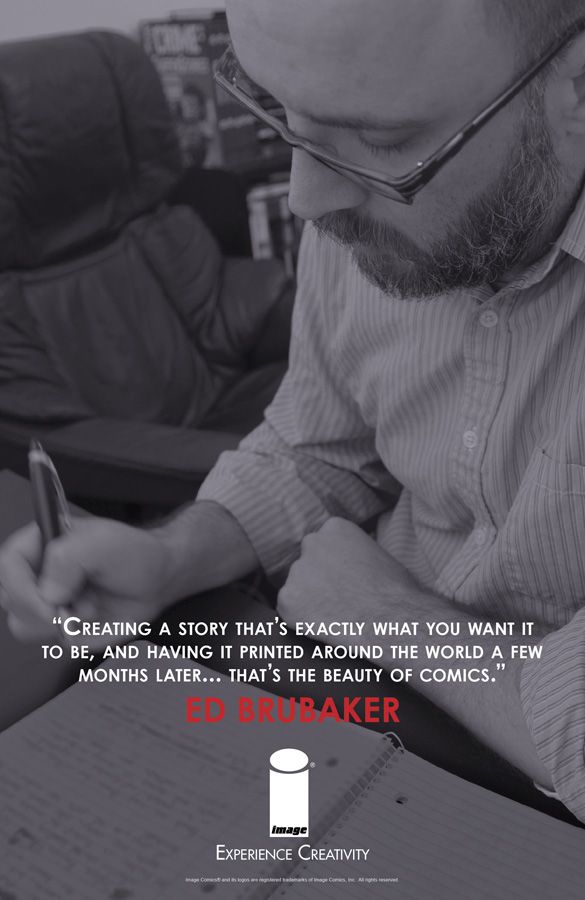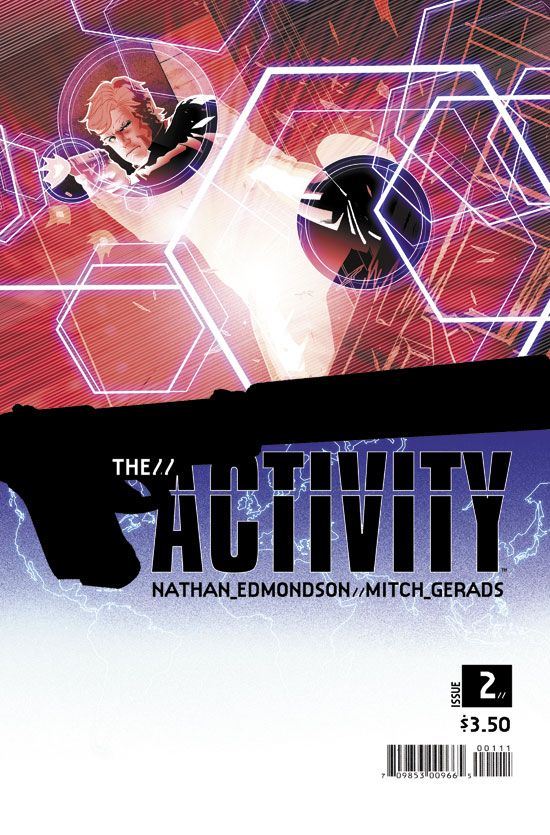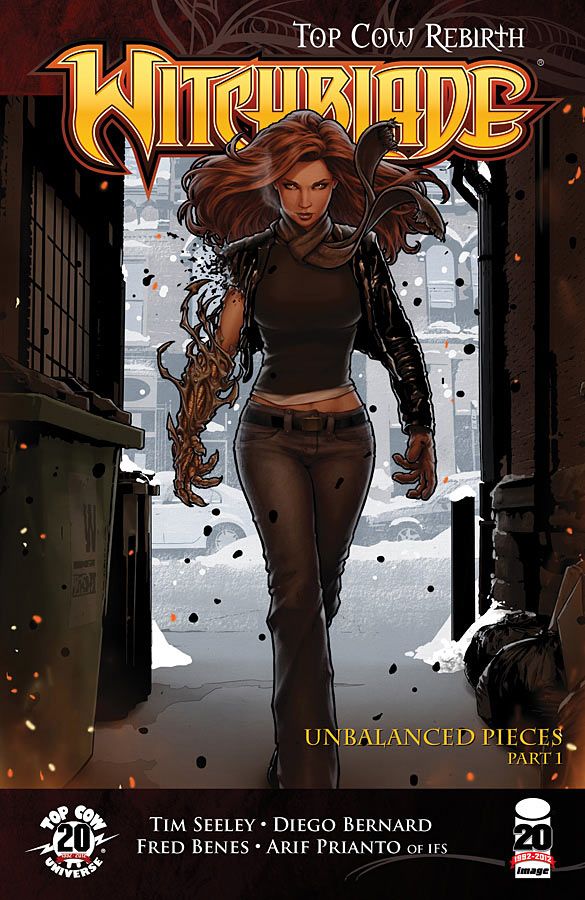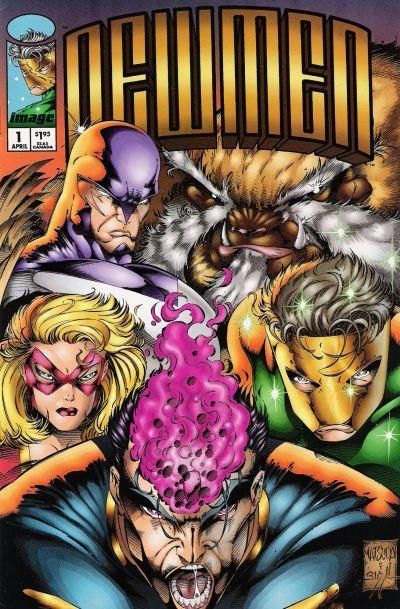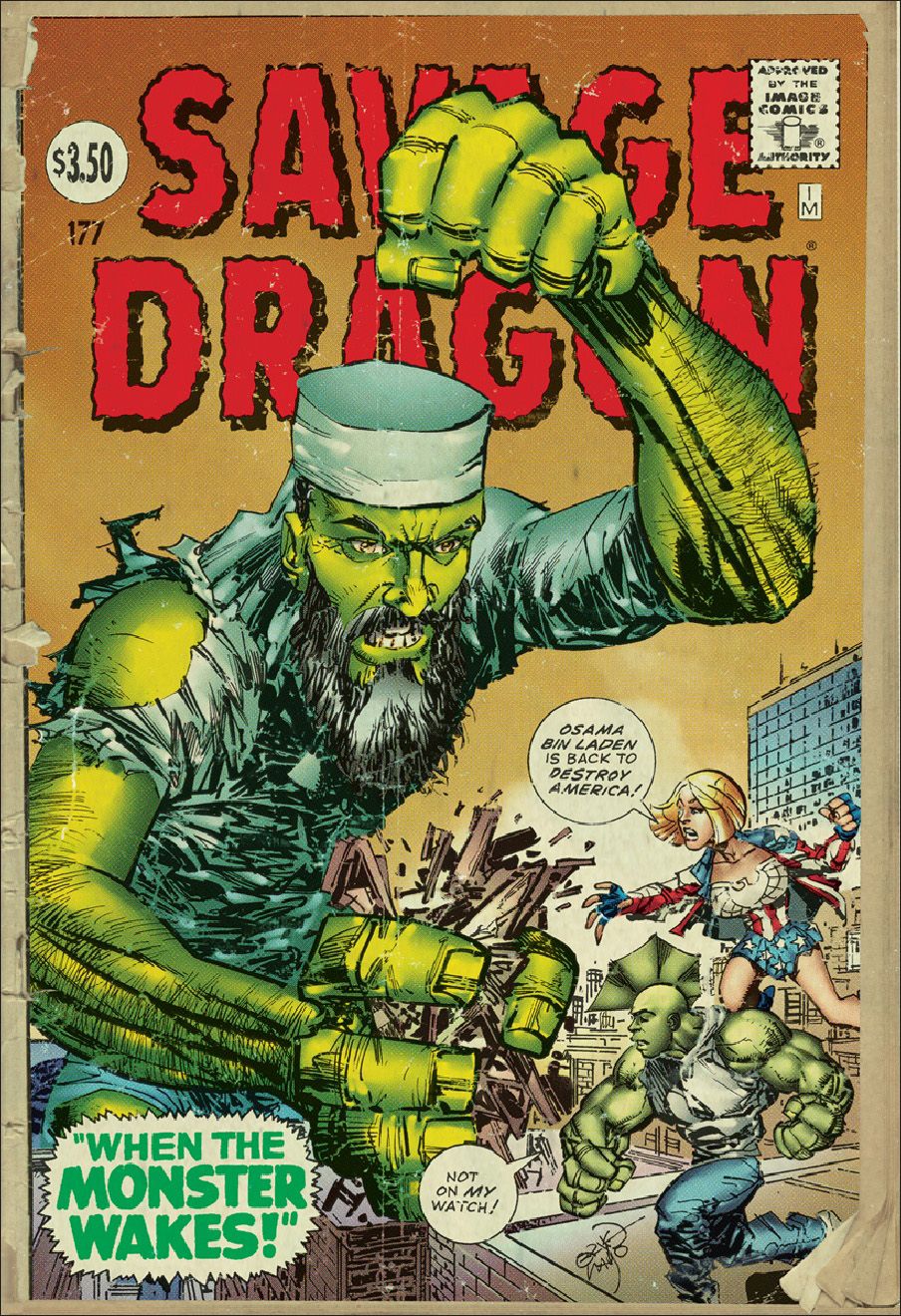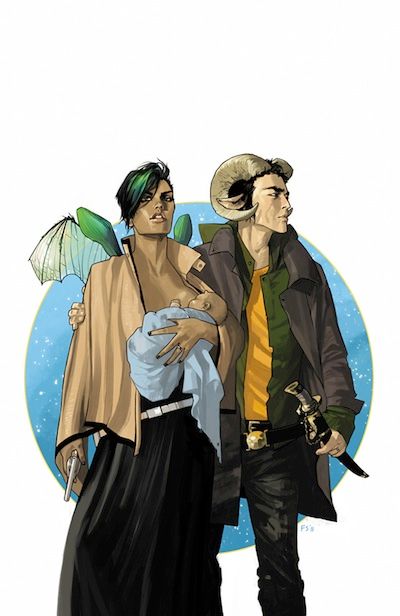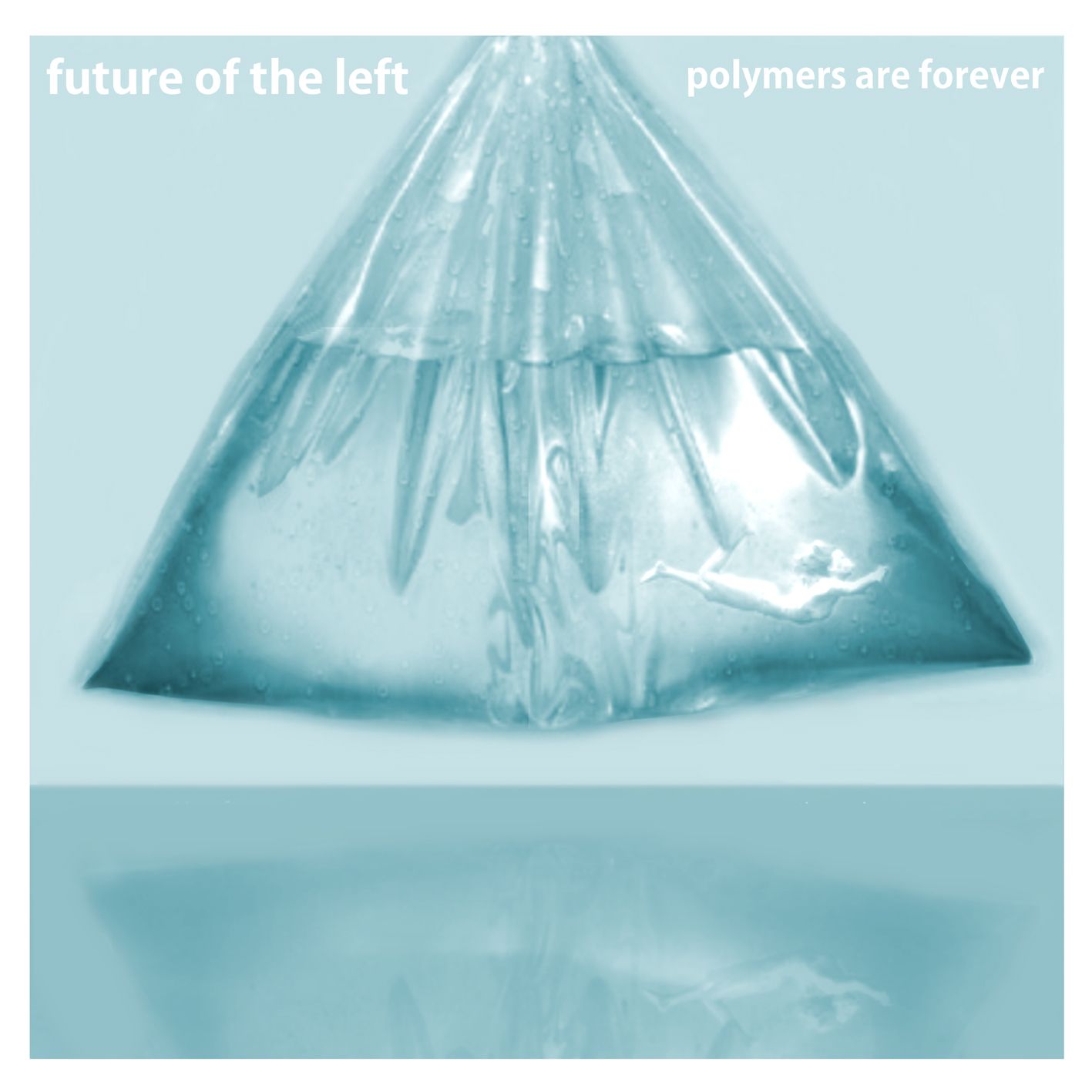This year marks the 20th anniversary of Image Comics, the company formed by a group of artists who left the security of work-for-hire comics to create and own their own comics. It's been 20 years of ups and downs, but one thing that has remained consistent is a focus on creator-owned work.
With 2011 in the history books and their big anniversary kicking off with the first Image Expo, a new ad campaign and high-profile series by big-name creators like Brian K. Vaughan, Ed Brubaker, Sean Phillips, Jonathan Hickman, Nick Spencer and many more, I thought it was a good time to chat with Publisher Eric Stephenson about the state of the company, the year that was, their upcoming plans and anything else he was willing to talk about. My thanks to Eric for taking the time to answer my questions.
JK Parkin: Thanks for agreeing to do this interview, Eric. Incidentally, another feature we’re running as a part of our anniversary bash is one where we asked various comic industry folks about what they’re looking forward to in 2012. I got one back yesterday where the answer was basically “everything from Image Comics.” I find that interesting, because there’s a lot of diversity in Image’s line and although I think you guys probably publish something for every kind of taste, I wouldn’t think that every title would appeal to every comic reader. And yet I also find myself checking out at least the first issue of everything you guys have done lately. So from your perspective, what's the unifying factor (or factors) right now among your titles, if there is one?
Stephenson: I think the main thing is that we're moving forward and creating new things. We're not content to just recycle the same old ideas month in and month out and then market it all as brand new. If this was another publisher, we'd be debuting our latest spin-off of The Walking Dead in March, but instead, we're launching a new series by Brian K. Vaughan and Fiona Staples, a new series by Jonathan Hickman and Nick Pitarra, a new series by Joe Keatinge and Andre Szymanowicz, and so on. For 20 years, Image has put its faith in creative people, and it's the power of their imagination that links all our titles together, now more than ever.
Parkin: Back in 2008, when you took your current job, you told CBR that one of your goals was “to make more people aware of some of the great comics Image is putting out, getting our books in front of more eyes.” From your perspective, are you meeting this goal? And what’s changed in this regard over the last three years?
Stephenson: I don't know if you're familiar with the fast food chain Hardee's, but they're a hamburger chain out in the Midwest and thereabouts. They were bought by the company that owns Carl's Jr. here in California toward the end of the '90s, but in the period leading up to that sale, they were kind of horrible. They developed a really bad reputation. After the takeover, they did some amusingly blunt ads that basically said, "We don't suck anymore," that attracted a bit of attention, but ultimately, the thing that turned their business around--and along with Carl's Jr., they're one of the top fast food chains in the country today--is that they started making better burgers. They stopped sucking, basically, and I think the message there is pretty simple: Quality never goes out of style.
Using that as kind of a point of reference, I don't think I'm speaking out of turn by saying Image has produced its fair share of shit over the years. You win some, you lose some, right? Well, I think we got to a point a while back where the losses were outnumbering the wins, and regardless of whether it's right or wrong, reputations are based on things like that. And that affects everything: How retailers order the books, how people perceive the books when they see them on the stands, how creators weigh their publishing options. I don't think we were ever in as dire shape as Hardee's, but our reputation had definitely suffered, and I think the main thing that's changed over the last three years is that Image is perceived in a much different--and much better--light.
It's an ongoing process, though. I don't think the work of making readers and retailers more aware of what we do ever really ends, regardless of the level of success. For every great new series we launch, there's always going to be someone pointing at one of our missteps from the past. It's that old "fool me once" thing--some people, especially retailers, remain skeptical. It's a trust issue, basically, and ultimately, the only way you earn that trust--or earn that trust back, if that's the case--is to keep producing the best work possible. Things are looking good on that front.
Parkin: 2011 was an “up” year for you guys, in terms of overall sales, on top of an already strong 2010. Looking back, what factors do you think led to this success?
Stephenson: I don't mean to sound repetitive, but I do think a lot of it has to do with not running on the spot. We've continued to move forward, you know? It hasn't hurt that The Walking Dead is a tremendously successful television show, but let's be clear--if we were just pushing out spin-offs of The Walking Dead and publishing a bunch of crap alongside that, our situation would be much different right now. We got a bit lucky in terms of the timing, I think. The Walking Dead show on AMC came at a time when we were actually ready to capitalize on it.
Parkin: As far as digital goes--I don’t think I can do an interview anymore without asking a “digital” question--I believe most, if not all, of your books are coming out digitally on the same day the print version hits comic shops. What kind of affect has going “same day digital” had on digital sales? Have print sales been affected? What plans do you have next year to get digital comics in particular in front of more people’s eyes?
Stephenson: Same day as print for digital has helped, definitely. There's been no negative impact on print sales so far, at least nothing that's particularly quantifiable anyway. Something I rail on about from time to time is that it's not necessarily the same audience, and I think that's kind of the beauty of it all. Having digital sales as an option broadens our reach. It broadens everybody's reach.
I think people spend too much time hemming and hawing over format, really, and with that in mind, our plans for 2012 are less about just narrowing our focus on digital, and more on reaching out to more readers across the board. We're going to do everything we can to raise awareness of Image in general, which serves the purpose of exposing more people to our comics, whether the format is digital or print.
Parkin: Speaking of raising Image's profile, you sent over a sample from an upcoming ad campaign. Can you talk a little bit about the concept behind it? And where will it be appearing?
Stephenson: Yeah, that ad will start running online and in most of our comics this week. We're doing one of these a week over the course of the year, each focusing on a different creator, and there will be some video components to the campaign as well.
The message is pretty simple: Our business thrives on creativity.
Everyone else throws their weight behind characters, behind IP. We put ours behind the people create those characters and develop that IP. The men and women who write and draw comics are Image's--and this industry's--most valuable resource. It takes a certain amount of bravery to create something of your own and share it with the world. We support those people, and we salute them.
Parkin: You guys put out a lot of new books in 2011 that shined the light on several new creators. Were there one or two projects you personally were particularly proud of in this regard?
Stephenson: The Strange Talent of Luther Strode is something I'm specifically proud of. I think Justin Jordan and Tradd Moore are doing great work with that, and it's been a real pleasure to see that book do as well as it has. Witch Doctor is a similar story--Robert found Brandon and Lukas and they've done some amazing work on that book. I think it's cool when someone kind of comes out of nowhere like that and just immediately start producing these great new comics. There's also Kurtis Wiebe and Scott Kowalchuk on The Intrepids. That book flew a bit under the radar for a lot of people, I think, but Kurtis and Scott are both tremendous talents that I think people need to pay more attention to.
Oh, and man – Nathan Edmondson! I really can't say enough about Nathan. Nathan did a book for us with Christian Ward called Olympus a while back, but as good as that was, it didn't quite prepare me for Who Is Jake Ellis? or The Activity. There's more where that came from, and I really couldn't be happier to have him here at Image.
Parkin: One Image book that had a lot of good buzz going this past year was Nonplayer #1, which came out early in the year and while initially under-ordered, seemed to do well in its second printing. Nate Simpson went on to win the Russ Manning Award at the Eisners this year. But then Simpson posted on his blog that he was involved in a bicycle accident that left him in a sling. Can you give us an update on how Nate is doing?
Stephenson: Well, Nate's finally drawing again, which was welcome news to receive. The original plan was to get Nonplayer out twice a year, and I hope we'll get back on that kind of schedule at some point in the future. It's too early to say just yet, though, and really I'm just happy Nate wasn't more seriously injured and that he's on the mend. We should have the second issue out sometime around the middle of the year.
Parkin: It also seemed to be a good year for older Image properties as well. Witchblade hit its 150th issue, Walking Dead is on its way to issue #100 and was a constant on the New York Times bestseller list. I think you guys published, what, 15 issues of Spawn this past year? And Savage Dragon doesn’t seem to ever miss a beat. How do you keep the creative momentum going on long-running titles, and how do you get new readers to check them out?
Stephenson: It's not always easy, especially with something like Savage Dragon. Erik and I actually talk about this a lot, because he's been doing Savage Dragon for 20 years, and he is the sole creator. He writes it. He draws it. We can't spike sales with a new writer. We can't promote a new artist. It will always be Erik Larsen. No one other than Dave Sim has committed to the kind of undertaking Erik is engaged in with Savage Dragon, but longevity isn't something that's necessarily rewarded these days. Erik provides a unique comics reading experience with the book, though, and ultimately, I think that becomes a selling point of its own. Erik has his own sensibilities and there's just no other comic like Savage Dragon.
On the other hand, we've got things like Witchblade or The Darkness, which is rapidly closing in on its 100th issue, and they do undergo changes in their creative teams. Tim Seeley is taking over Witchblade with #151 – I just got a printed copy of that today, actually – and I think people are really going to like what he's doing with that. It's a new beginning for the character and whether you're a fan of Tim's or a fan of the character, it's great work. David Hine and Jeremy Haun take over The Darkness with issue #101 and that's going to be a great jumping on point for that book, too. We could have relaunched that with a new number one, but you know – that's been done before. It's been done to death, in fact. There has never been a Darkness #101 before. There actually haven't been a lot of #101s where independent comics are concerned. There's like a handful and Spawn, Savage Dragon, Witchblade and The Darkness are amongst them. I think that's something to be proud of, frankly.
And you're right, there were 15 issues of Spawn during 2011, and that's something to be proud of, too. Todd and his team took that book from being months behind and got it back on track, and better yet, did so not only without sacrificing quality, but by upping their game. That book is currently the best it's been in years and years, and I think it's really cool that with everything else he does, Todd was able to kind of regroup and infuse the book with some new energy.
Parkin: Speaking of older properties, Extreme is back, and it’s where you got your start in the industry. Now that you’re seeing new kids playing in the sandbox you helped create back in the 1990s, is there any urge on your part to jump back in on the creative side and work on any of the titles?
Stephenson: Rob and I have talked a bit about adding New Men to the line-up, so that's kind of a possibility, but I don't know. We'd have to find the right artist, especially given that the previous artists on that title--first Jeff Matsuda, then Todd Nauck and then Chris Sprouse--were such amazing talents. I kind of think of Todd as the definitive New Men artist, because he and I worked really closely on the book and did all but what?--nine of the issues together. But he's busy with a new project, and I don't think he's sitting around thinking of ways to eliminate all his free time by taking on another series. I always liked those characters, though, and under the right circumstances, it would be fun to revisit them. I'd have to have time, too, because I have a couple projects of my own that are moving along at a dreadfully slow pace. I have the first issue of a new series sitting here that is completely drawn, colored and lettered, but no one's going to see a page of it until I'm certain it can come out regularly, and there are a lot of other factors involved in making that happen. My absolute first priority is Image Comics and whatever creative work I do comes well behind that.
Parkin: Looking at 2012, it’s the 20th anniversary of Image, and you’ve announced several new projects by big-name creators (like Fatale and Saga), as well as the Image Expo in Oakland this spring. What else does Image have planned to celebrate the big anniversary?
Stephenson: Our primary focus over 2012 is to publish great new comics. We got a little lucky in that we have some outstanding work by some truly brilliant writers and artists on tap for our anniversary, and I think that's the best way to celebrate 20 years of creativity. We hit the ground running this week with Ed and Sean's Fatale #1 and we're just going to keep going from there. Every single one of our 2012 books is going to be worth watching.
We have a couple of fun retrospective things we're doing--there's going to be a series of tribute cover variants by a single artist. I know some people groan at the merest mention of variants, but these are done out of fun and they'll make a nice little set when they're all out. There will be a couple other things like that, but really, we're celebrating our 20th anniversary by being at our all-time best.
Parkin: Do you have specific goals set out for Image to achieve in 2012? What do you think will be the biggest challenges for Image in 2012?
Stephenson: I think the biggest challenge is pretty much the same as it's been the last few years, because I think we all know there are segments of this industry that take almost a strange kind of pride in complacency. There's a growing aversion to new ideas that I find really puzzling, because this entire business was built on new ideas. It's self-sabotaging, and it gets a bit depressing, really, because it reduces this business to… Have you seen Midnight In Paris? Owen Wilson's character in that, he's writing this novel about a guy who owns a nostalgia shop, a shop where people can kind of wallow in the ephemera of the past. If all we're going to do as an industry or even as a readership is cling to the past, then that's what the direct market will become: a dwindling handful of nostalgia shops catering to the narrow interests of a greying market that collects the same thing month in and month out, out of habit or misty-eyed sentimentality. Because that's the crossroads we're at: We can either move forward and support the kind of unbridled imagination that has fueled this industry since it began, or we keep rummaging about in the same old bag of tricks until it's finally empty.
So that's the challenge. And it's a big challenge, but our goal at Image, going into 2012, is to remind everyone that creativity is the lifeblood of this industry. Creativity gave us Superman. It gave us Batman. It gave us The Spirit. The Fantastic Four. Spider-Man. Cerebus. Maus. Watchmen. Sandman. Sin City. Spawn. Savage Dragon. Hellboy. Bone. Stray Bullets. The Invisibles. Transmetropolitan. Y: The Last Man. The Walking Dead. Scott Pilgrim. The Umbrella Academy. Kick Ass. Every great success this industry has ever known is the result of creativity.
And creativity doesn't come from playing it safe, and it doesn't come out of nowhere. It starts with people, and over the course of the next year, Image Comics is going to shine a light on all the wonderful creative people we work with, because if creativity is the lifeblood of this industry, then creators are its heart. We've been behind the men and women who enrich our lives with the fruits of their imaginations for 20 years, and this year, it's our mission to make that commitment clearer than ever.
Parkin: As far as projects go, we’ve heard about comics like Fatale, Saga and Thief of Thieves by big-name folks, but Image is also really good at finding unknown or new talent. Is there a particular project coming up in 2012 by someone we may not have heard about that has you particularly excited?
Stephenson: Yes.
Parkin: What’s the status of Image United?
Stephenson: Me sobbing uncontrollably in the bathtub? (laughs)
Seriously, it's being worked on. Slower than we would all like, for sure, but it's coming along. The unfortunate reality of the situation is that not finishing it sooner complicated things more than it should have. With six different artists all working on almost every page, once things started to run off the rails, we began running into scheduling conflicts that became more and more unavoidable. The good news--or the better than completely fucking terrible news, really--is that the fourth issue is very close to being finished. At this point, the goal is to complete the remaining three issues and release them monthly sometime in 2012.
Parkin: DC and Marvel seem to always be under the gun to produce books with female lead and/or female creators. How is Image doing on the female lead and female creators front?
Stephenson: That's a tricky question, because there's a very profound difference between Image and DC/Marvel and that's that we don't dictate who our creators are or what they do. If female creators don't pitch projects to us, then we don't have projects by female creators, and we don't receive that many pitches from women. Blair Butler brought us Heart, though, and Emi Lenox did EmiTown here. Marian Churchland won a Russ Manning award for her graphic novel Beast, and she's done some great work on Elephantmen. Half the staff here in the Image office are women.
You just noted that Witchblade recently hit #150--it's the longest running independent comic with a female lead. Glory, Hack/Slash, Avengelyne and Shinku all feature female leads, and while I realize the politically incorrect satire of Bomb Queen may not be for everyone, the title character is definitely a woman. One of the biggest books we're putting out this year is Brian K. Vaughan and Fiona Staples' Saga, and one of the main characters in that is female. Alpha Girl seems pretty self-explanatory. Next month, we're publishing more work by Emi, along with a new autobio book by Natalie Nourigat. Blair is putting together another project for us, and those are just the things I'm at liberty to discuss right now. Every now and then we'll reach out to someone specific – I'd love it if we were working with Marjorie Liu, for instance, and getting Pia Guerra to do something here would be a dream come true, and the same goes for Chynna Clugston – but ultimately, it all comes down to when people are available and whether they actually have something they want to do.
Or to put it another way: If you're a female writer or artist with an awesome creator-owned project you'd like to get off the ground, send me an email. Even if you're just thinking about it and you have some questions about how Image works or whatever – send me an email. If I get eight killer proposals, then that's eight new Image books by female talent. It's that simple.
Parkin: Speaking of pitches, how many do you receive via email in a given week? And how many of the blind ones go on to become comics?
Stephenson: Dozens. I get dozens of proposals every week, but very few are accepted. In the 10 years I've been on staff at Image, I think we've accepted fewer than 10.
Parkin: On your personal blog, where you occasionally talk about Image and the industry and what not, you also spend a lot of time talking about music. As we move into the new year, what’s on your playlist right now?
Stephenson: You know, it's a funny thing with my blog. When I first started it, I was really reluctant to focus too much on the industry or comics at all. I was mainly doing it for my own edification, just keeping a journal about things that caught my attention, but the comics stuff slowly crept in. It's hard not to comment on certain things, whether it's something I'm excited about or something that rubs me the wrong way. Usually, though, I'm waxing enthusiastic about the things I love, and a great deal of the time, that's music. I'm pretty sure I would fade from existence without music, it's such a vital part of my life.
Playlist-wise… I listen almost exclusively to vinyl at home, and I'm always on the hunt for more – I just picked up albums by Horace Silver, the Detroit Emeralds, Marvin Gaye, Joni Mitchell, Fairport Convention, David Bowie and the Swingle Singers, and then there was that big Smiths box set with all the remastered albums. There's just so much great music out there, and it's fun to kind of connect the dots between different things.
Probably the thing I've been listening to most frequently over the last couple weeks, though, is this EP by Future of the Left called Polymers Are Forever. That made me go back to the band that Future of the Left grew out of, Mclusky, and start listening to those albums again, which I hadn't done in quite a while. Both bands are so loud and angry, but not necessarily in the way you might expect. A good touchstone might be Big Black, or maybe Shellac. There's a lot of dark humor to their lyrics and that always appeals to me. They have a full album coming fairly soon called The Plot Against Common Sense and I'm looking forward to that. I've really been enjoying this album by a guy called Jonathan Wilson, too. It's called Gentle Spirit and it has a very Laurel Canyon in the early '70s kind of vibe about it, if you know what I mean. I have the same sort of outlook to music that I have towards comics, or anything, really--I like discovering new stuff. Like everyone, I have my old favorites, but there's nothing quite like the experience of coming across something new.



